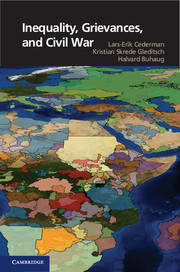Book contents
- Frontmatter
- Contents
- Tables
- Figures
- Preface
- 1 Introduction
- Part I Theories and concepts
- Part II Empirical analysis of civil war onset
- 4 Political Exclusion and Civil War
- 5 Economic Inequality and Civil War
- 6 Transborder Ethnic Kin and Civil War
- 7 Country-Level Inequalities and Civil War
- Part III Beyond civil war onset
- References
- Index
4 - Political Exclusion and Civil War
Published online by Cambridge University Press: 05 June 2014
- Frontmatter
- Contents
- Tables
- Figures
- Preface
- 1 Introduction
- Part I Theories and concepts
- Part II Empirical analysis of civil war onset
- 4 Political Exclusion and Civil War
- 5 Economic Inequality and Civil War
- 6 Transborder Ethnic Kin and Civil War
- 7 Country-Level Inequalities and Civil War
- Part III Beyond civil war onset
- References
- Index
Summary
Do civil wars result from political exclusion? This chapter evaluates empirically the mechanisms that trigger internal conflict as a function of political horizontal inequality, as manifested through the exclusion of ethnic groups from central executive state power. Rather than viewing ethnicity as a politically disconnected, demographic characteristic reflecting linguistic and cultural diversity, as is often done in the contemporary civil war literature, we contextualize ethnicity macro-historically as a political organization form embedded in nationalism.
In Chapter 3, we discussed how nationalist politics leads to the generation of political horizontal inequality. In the present chapter, we shift the attention from the origins of inequalities to their consequences for internal conflict. Nationalism defines the macro setting within which much, possibly even most, large-scale political violence unfolds in the modern world. Drawing on Gilpin's (1981) terminology, this type of transformation can be classified as “nationalist systems change.” Viewed as a special case of the broader category of systems change that features fundamental transformations of the main actor types defining politics, this type of macro-historical process prompted nations to play the main role on the world stage along with states, roughly from the time of the French Revolution (Cederman, Warren, and Sornette 2011; see also Hall 1999). The importance of the nation can be found in the way that this entity legitimizes the state. As opposed to the “descending” principle of territorial sovereignty that justifies governance in personal, dynastic, and possibly even divine terms, the French Revolution introduced an “ascending” logic that defines the people, conceived of as the nation, as the locus of political legitimacy (Calhoun 1997).
- Type
- Chapter
- Information
- Inequality, Grievances, and Civil War , pp. 57 - 92Publisher: Cambridge University PressPrint publication year: 2013
- 1
- Cited by



